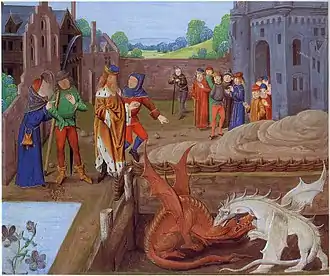King of the Britons
The title King of the Britons (Welsh: Brenin y Brythoniaid, Latin: Rex Britannorum) was used (often retrospectively) to refer to a ruler, especially one who might be regarded as the most powerful, among the Celtic Britons, both before[1] and after[2] the period of Roman Britain up until the Norman invasion of Wales and the Norman conquest of England. Britons were the Brittonic-speaking (ancestral language of Welsh) peoples of what is now Wales, England and southern Scotland. The Britons are the ethnic ancestors of the Welsh in addition to the Cornish and Bretons.[3]
During the Norman and Plantagenet periods, only Wales (or parts thereof) remained under Brittonic rule in Britain and the term "Britons" (Brythoniaid, Britaniaid, Brutaniaid) was used in Britain to mean the Welsh people (Cymry in modern Welsh). This, and the diminishing power of the Welsh rulers relative to the Kings of England, is reflected in the gradual evolution of the titles by which these rulers were known from "King of the Britons" in the 11th century to "Prince of Wales" in the 13th.[2]
List of the Kings of the Britons, Kings in Wales, Princes of Wales
| Name | Depiction | Reign | Regional power base | Recorded title or description | Source | Notes |
|---|---|---|---|---|---|---|
| Kings prior to this period are generally regarded as fictional Legendary Kings of Britain | ||||||
| Cassivellaunus | 54BC | |||||
| Tasciovanus | 20 BC – 9 AD | |||||
| Cunobeline
(Welsh: Cynfelyn) |
 | 9 – 40 | lands of the Trinovantes and Catuvellauni | King of the Britons | Suetonius, Dio Cassius | perhaps retrospective |
| (Roman rule from 43 to 410 AD) | ||||||
| Tiberius Claudius Cogidubnus / Togodumnus | 40–43 | lands of the Regni, Atrebates, and Belgae | Great King of the Britons (or perhaps: Great King of Britain) | marble inscription at Chichester | contemporary, self-description | |
| (post-Roman, from 410 AD) | ||||||
| Vortigern
(Welsh: Gwrtheyrn) |
 | mid-5th century | unknown, but traditionally Powys | King of the Britons (in c. 449) | Bede | probably retrospective |
| Riothamus | c. 469 | unknown, but active in Gaul | King of the Britons (in c. 469) | Jordanes | may refer only to Britons in Gaul | |
| Ambrosius Aurelianus
(Welsh: Emrys Wledig) |
_Emrys_Wledig.jpg.webp) | late 5th century | probably in the south | Leader [of the Britons] | Gildas | near contemporary |
| unnamed | c. 545 | unknown | King over them [the Britons] | Procopius[4] | contemporary but distant | |
| Maelgwn Gwynedd | _Maelgwn_Gwynedd_Detail.jpg.webp) | ?–549? | Gwynedd | King [who] reigned among the Britons | Historia Brittonum | retrospective |
| Selyf ap Cynan | ?– c. 613 | Powys | King of the Britons (in c. 613) | Annals of Ulster | near contemporary | |
| Ceretic of Elmet
(Welsh: Ceredig ap Gwallon) |
c. 614 – 617 | Elmet | King of the Britons (in 614) | Bede | may refer only to Britons in Elmet | |
| Cadwallon ap Cadfan | _Cadwallon_fab_Cadfan.jpg.webp) | ?–634 | Gwynedd | (Cadwalla,) King of the Britons (in 633) | Bede | |
| Idris ap Gwyddno | ?–635 | unknown. perhaps Meirionnydd | King of the Britons (in 635) | Annals of Ulster (sub anno 633)[5] | perhaps Idris Gawr | |
| Eugein I of Alt Clut | c. 642 | Strathclyde | King of the Britons (in 642) | Annals of Ulster | ||
| Rule within the modern territory of Wales only | ||||||
| Cadwaladr | _Cadwaladr_Fendigaid.jpg.webp) | c. 654 – c. 664 | Gwynedd | [King who] reigned among the Britons | Historia Brittonum | retrospective |
| Ifor | 683–698 | Llydaw (Brittanny) | "Sovereignty of the Britons" | Brut y Tywysogion[6] | ||
| Rhodri Molwynog | c. 712 – 754 | Gwynedd | King of the Britons (in 754) | Annales Cambriae | perhaps retrospective | |
| Use of King of Wales title begins (King of the Britons title continues also) | ||||||
| Cynan Dindaethwy | 798–816 | Gwynedd (insecurely from 754) | King of the Britons (in 816); The King (in 816) | Annals of Ulster; Annales Cambriae | ||
| Merfyn Frych | 825–844 | Gwynedd | King of the Britons (in 829); Glorious King of the Britons | Historia Brittonum; Bamberg Cryptogram | contemporary | |
| Rhodri the Great (Welsh: Rhodri Fawr) |  | 844–878 | Gwynedd, from 855 also Powys, from 872 also Seisyllwg | King of the Britons (in 878)
|
Annals of Ulster | |
| Anarawd ap Rhodri | 878–916 | Gwynedd | King of the Britons (in 916)
|
Annales Cambriae | ||
| Idwal Foel ap Anarawd | 916–942 | Gwynedd | King of the Britons (in 927) | William of Malmesbury | ||
| Hywel Dda |  | 942–950 | Deheubarth (from 920), from 942 also Gwynedd and Powys | King of the Britons (in 950) | Annals of Ulster and Annales Cambriae | |
| Dyfnwal ab Owain | 930s–970s | Strathclyde | King of the Britons (in 973) | Annals of Ulster | ||
| Maredudd ab Owain | 986–999 | Deheubarth and Gwynedd and Powys | King of the Britons (in 999) | Brut y Tywysogion | ||
| Llywelyn ap Seisyll | 1018–1023 | Gwynedd and Powys; from 1022 also Deheubarth | King of the Britons (in 1023)
|
Annals of Ulster | ||
| Iago ab Idwal | 1023–1039 | Gwynedd and Powys | King of the Britons (in 1039) | Annals of Ulster | ||
| Gruffydd ap Llywelyn | 1039–1063 | Gwynedd and Powys, from 1057 also the rest of Wales | King of the Britons (in 1063; in 1058)
Rex Walensium ("King of Wales")[12] |
Annals of Ulster; Brut y Tywysogion | ||
| Bleddyn ap Cynfyn | 1063–1075 | Gwynedd and Powys and Seisyllwg | Support[er of] the whole Kingdom of the Britons (in 1075); Chiefest of the Britons | Brut y Tywysogion (sub anno 1173; sub anno 1113) | ||
| Rhys ap Tewdwr | 1079–1093 | Deheubarth (insecurely until 1081) | [Upholder of the] Kingdom of the Britons (in 1093) | Brut y Tywysogion | ||
| Use the title of Prince of Wales begins (King of Wales title continues also) | ||||||
| Gruffudd ap Cynan |  | 1136–1137 | Gwynedd (insecurely from 1081) | King of all the Welsh (in 1137) | Brut y Tywysogion | |
| Owain Gwynedd | .jpg.webp) | 1137–1170 | Gwynedd | Prince over the British nation (in 1146); King of Wales, King of the Welsh, Prince of the Welsh | Brut y Tywysogion; contemporary charters[13] | |
Other uses
| Geraint | ?670–c. 710 | Dumnonia | King of the Welsh (=Britons) (in 710) | Anglo-Saxon Chronicle | May refer only to Britons in Dumnonia
(Not mentioned by Brut y Tywysogion, so possibly a King of the Welsh in Dumnonia only) |
References
- Stuart Laycock (2008). Britannia: The Failed State. Tempus. ISBN 978-0-7524-4614-1.
- Kari Maund (2000). The Welsh Kings: The Medieval Rulers of Wales. Tempus. ISBN 0-7524-2321-5.
- C. A. Snyder (2003). The Britons. Blackwell. ISBN 0-631-22260-X.
- Procopius (2000). History of the Wars (book 8, chapter 20, verses 6–10). Translated by H. B. Dewing. Harvard University Press. ISBN 0-674-99191-5.
- Annals of Ulster, 633.1 "Bellum Iudris regis Britonum"
- "Archaeologia Cambrensis (1846–1899) | BRUT Y TYWYSOGION: GWENTIAN CHRONICLE 1863 | 1863 | Welsh Journals – The National Library of Wales". journals.library.wales. p. 5. Retrieved 26 July 2022.
- "Archaeologia Cambrensis (1846-1899) | BRUT Y TYWYSOGION: GWENTIAN CHRONICLE 1863 | 1863 | Welsh Journals - The National Library of Wales". journals.library.wales. Retrieved 26 July 2022.
- "Archaeologia Cambrensis (1846-1899) | BRUT Y TYWYSOGION: GWENTIAN CHRONICLE 1863 | 1863 | Welsh Journals - The National Library of Wales". journals.library.wales. Retrieved 26 July 2022.
- "Archaeologia Cambrensis (1846-1899) | BRUT Y TYWYSOGION: GWENTIAN CHRONICLE 1863 | 1863 | Welsh Journals - The National Library of Wales". journals.library.wales. Retrieved 26 July 2022.
- "Archaeologia Cambrensis (1846-1899) | BRUT Y TYWYSOGION: GWENTIAN CHRONICLE 1863 | 1863 | Welsh Journals - The National Library of Wales". journals.library.wales. Retrieved 26 July 2022.
- "Archaeologia Cambrensis (1846-1899) | BRUT Y TYWYSOGION: GWENTIAN CHRONICLE 1863 | 1863 | Welsh Journals - The National Library of Wales". journals.library.wales. Retrieved 26 July 2022.
- Maund, K. L. (1991). Ireland, Wales, and England in the Eleventh Century. Boydell & Brewer Ltd. p. 27. ISBN 978-0-85115-533-3.
- Carpenter, David (2003). The struggle for mastery: Britain 1066–1284. ISBN 9780140148244.